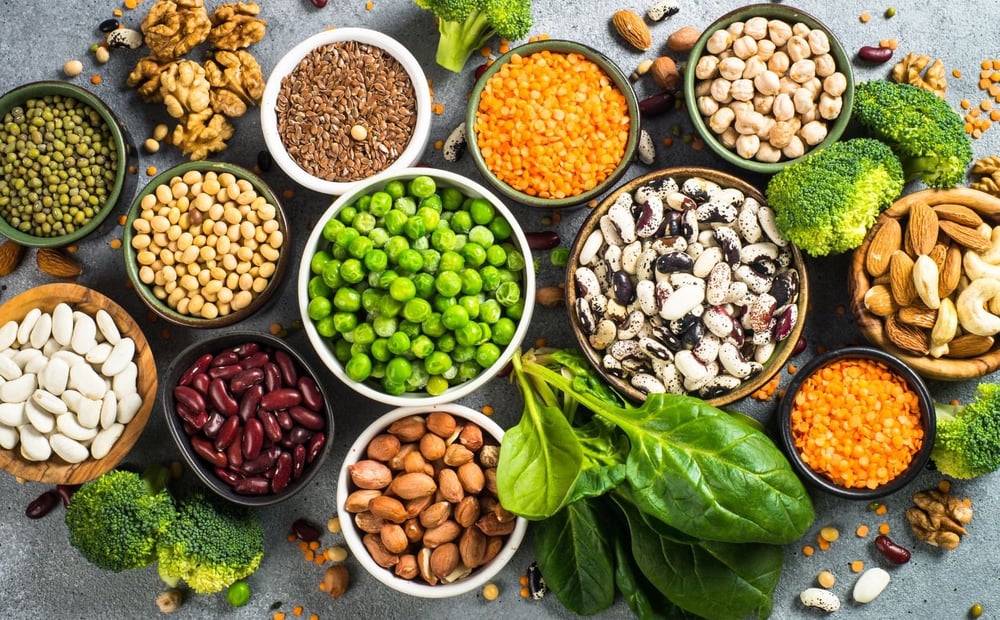PLANT-BASED PROTEINS FOR MUSCLE RECOVERY
fitness Nutrition Mindset Aug 9, 2025 9:01:22 AM Kyle Receno 8 min read

Plant-based proteins are an effective and sustainable option for supporting muscle recovery after exercise, offering essential amino acids, vitamins, and minerals. Whether you're vegan, vegetarian, or simply reducing animal protein intake, plant-based sources can meet your recovery needs. This blog explores the science behind plant-based proteins, their benefits for muscle repair, and practical ways to incorporate them into your diet.
Why Plant-Based Proteins Matter for Muscle Recovery
Exercise causes micro-tears in muscle fibers, requiring protein to repair and rebuild tissue. Plant-based proteins provide essential amino acids (EAAs), particularly leucine, which triggers muscle protein synthesis. Combining diverse plant sources ensures a complete amino acid profile, supporting recovery, reducing soreness, and promoting muscle growth.
Key Benefits:
- Muscle Repair: Supplies amino acids to rebuild damaged tissue.
- Reduced Inflammation: Many plant proteins include anti-inflammatory compounds.
- Sustainable Nutrition: Environmentally friendly compared to animal proteins.
- Improved Digestion: Often easier on the stomach due to fiber content.
- Overall Health: Rich in vitamins, minerals, and antioxidants.
Top Plant-Based Protein Sources
Below are effective plant-based protein sources for muscle recovery, their nutritional profiles, and how to use them.
1. Lentils
Nutrition: 18g protein per cooked cup, rich in iron and fiber.
- Why It Helps: Provides leucine and supports energy metabolism for recovery.
- How to Use: Add to soups, salads, or make lentil patties.
- Serving: 1 cup cooked (18g protein, 40g carbs).
2. Tofu
Nutrition: 10g protein per ½ cup, high in calcium and iron.
- Why It Helps: Complete protein with all EAAs, ideal for muscle repair.
- How to Use: Stir-fry with veggies or blend into smoothies.
- Serving: ½–1 cup (10–20g protein).
3. Quinoa
Nutrition: 14g protein per cooked cup, complete protein with magnesium.
- Why It Helps: Supports muscle repair and glycogen replenishment.
- How to Use: Use as a base for bowls with beans and greens.
- Serving: 1 cup cooked (14g protein, 39g carbs).
4. Chickpeas
Nutrition: 15g protein per cooked cup, high in fiber and folate.
- Why It Helps: Provides leucine and supports digestive health.
- How to Use: Roast for snacks, blend into hummus, or add to curries.
- Serving: 1 cup cooked (15g protein, 45g carbs).
5. Pea Protein Powder
Nutrition: 20–25g protein per scoop (25g), high in leucine.
- Why It Helps: Convenient, high-protein option for post-workout shakes.
- How to Use: Blend with fruit and plant milk for a recovery smoothie.
- Serving: 1 scoop (20–25g protein).
6. Hemp Seeds
Nutrition: 10g protein per 3 tbsp, rich in omega-3s and magnesium.
- Why It Helps: Reduces inflammation and supports muscle function.
- How to Use: Sprinkle on yogurt, salads, or blend into smoothies.
- Serving: 3 tbsp (10g protein, 8g fat).
7. Black Beans
Nutrition: 15g protein per cooked cup, high in fiber and antioxidants.
- Why It Helps: Supports muscle repair and sustained energy.
- How to Use: Add to tacos, salads, or make bean burgers.
- Serving: 1 cup cooked (15g protein, 41g carbs).
Sample Plant-Based Recovery Meal Plan
This plan for a 70-kg individual supports muscle recovery with ~1.6–2.2g protein/kg daily (112–154g):
- Breakfast: Quinoa porridge with hemp seeds, berries, and almond milk (20g protein, 40g carbs).
- Post-Workout Snack: Pea protein shake with banana and spinach (25g protein, 30g carbs).
- Lunch: Lentil and chickpea salad with olive oil dressing and kale (25g protein, 50g carbs).
- Snack: Roasted chickpeas and a handful of almonds (15g protein, 20g carbs).
- Dinner: Tofu stir-fry with black beans, broccoli, and brown rice (30g protein, 60g carbs).
- Evening Snack: Greek-style plant-based yogurt with pumpkin seeds (10g protein, 15g carbs).
Tips for Success
- Combine Protein Sources: Pair grains (quinoa) with legumes (beans) for a complete amino acid profile.
- Time Your Intake: Consume 20–30g protein within 30–60 minutes post-workout for optimal recovery.
- Stay Hydrated: Drink 0.7–1 oz water/kg body weight daily to aid nutrient absorption.
- Add Carbs: Include carbs (1–1.2g/kg post-workout) like rice or fruit to replenish glycogen.
- Supplement Wisely: Use pea or rice protein powder if struggling to meet protein needs.
Common Mistakes to Avoid
- Incomplete Amino Acid Profile: Relying on one source (e.g., only lentils) may limit EAAs; diversify daily.
- Low Protein Intake: Aim for 1.6–2.2g/kg body weight to support muscle repair.
- Skipping Post-Workout Nutrition: Delaying meals beyond 60 minutes slows recovery.
- Overloading Fiber Pre-Workout: High-fiber meals before exercise may cause discomfort.
Who Can Benefit?
Plant-based proteins for muscle recovery are ideal for:
- Vegans/Vegetarians: Meets protein needs without animal products.
- Athletes: Supports recovery for endurance or strength training.
- Fitness Enthusiasts: Enhances muscle repair for consistent workouts.
- Eco-Conscious Individuals: Aligns with sustainable eating habits.
Additional Considerations
- Micronutrients: Include vitamin B12 (fortified foods), iron (lentils), and omega-3s (hemp seeds) to support overall health.
- Meal Prep: Batch-cook quinoa or lentils to streamline post-workout meals.
- Consult a Dietitian: Tailor plans for specific needs, especially if new to plant-based eating.
Conclusion
Plant-based proteins like lentils, tofu, quinoa, and pea protein are effective for muscle recovery, offering amino acids and anti-inflammatory benefits. By diversifying sources and timing intake around workouts, you can optimize repair, reduce soreness, and boost performance. Start with the sample plan and adjust to your needs for sustainable results.
Disclaimer: Consult a dietitian or healthcare provider before making dietary changes, especially if you have medical conditions or nutrient deficiencies.
